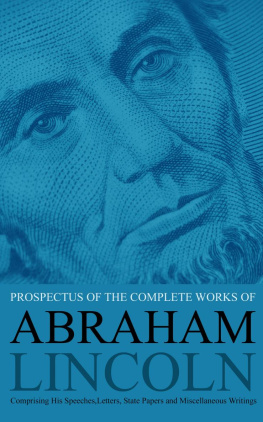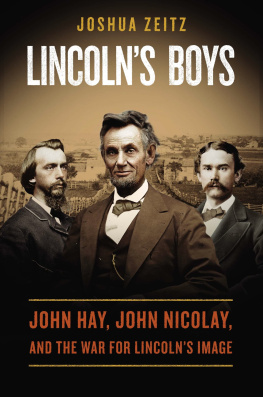THE BOYS' LIFE OF ABRAHAM LINCOLN
by Helen Nicolay
I. A PRESIDENT'S CHILDHOOD
Abraham Lincoln's forefathers were pioneersmen who left their homes to open up the wilderness and make the way plain for others to follow them. For one hundred and seventy years, ever since the first American Lincoln came from England to Massachusetts in 1638, they had been moving slowly westward as new settlements were made in the forest. They faced solitude, privation, and all the dangers and hardships that beset men who take up their homes where only beasts and wild men have had homes before; but they continued to press steadily forward, though they lost fortune and sometimes even life itself, in their westward progress. Back in Pennsylvania and New Jersey some of the Lincolns had been men of wealth and influence. In Kentucky, where the future President was born on February 12, 1809, his parents lived in deep poverty Their home was a small log cabin of the rudest kind, and nothing seemed more unlikely than that their child, coming into the world in such humble surroundings, was destined to be the greatest man of his time. True to his race, he also was to be a pioneernot indeed, like his ancestors, a leader into new woods and unexplored fields, but a pioneer of a nobler and grander sort, directing the thoughts of men ever toward the right, and leading the American people, through difficulties and dangers and a mighty war, to peace and freedom.
The story of this wonderful man begins and ends with a tragedy, for his grandfather, also named Abraham, was killed by a shot from an Indian's rifle while peaceably at work with his three sons on the edge of their frontier clearing. Eighty-one years later the President himself met death by an assassin's bullet. The murderer of one was a savage of the forest; the murderer of the other that far more cruel thing, a savage of civilization.
When the Indian's shot laid the pioneer farmer low, his second son, Josiah, ran to a neighboring fort for help, and Mordecai, the eldest, hurried to the cabin for his rifle. Thomas, a child of six years, was left alone beside the dead body of his father; and as Mordecai snatched the gun from its resting-place over the door of the cabin, he saw, to his horror, an Indian in his war-paint, just stooping to seize the child. Taking quick aim at a medal on the breast of the savage, he fired, and the Indian fell dead. The little boy, thus released, ran to the house, where Mordecai, firing through the loopholes, kept the Indians at bay until help arrived from the fort.
It was this child Thomas who grew up to be the father of President Abraham Lincoln. After the murder of his father the fortunes of the little family grew rapidly worse, and doubtless because of poverty, as well as by reason of the marriage of his older brothers and sisters, their home was broken up, and Thomas found himself, long before he was grown, a wandering laboring boy. He lived for a time with an uncle as his hired servant, and later he learned the trade of carpenter. He grew to manhood entirely without education, and when he was twenty-eight years old could neither read nor write. At that time he married Nancy Hanks, a good-looking young woman of twenty-three, as poor as himself, but so much better off as to learning that she was able to teach her husband to sign his own name. Neither of them had any money, but living cost little on the frontier in those days, and they felt that his trade would suffice to earn all that they should need. Thomas took his bride to a tiny house in Elizabethtown, Kentucky, where they lived for about a year, and where a daughter was born to them.
Then they moved to a small farm thirteen miles from Elizabethtown, which they bought on credit, the country being yet so new that there were places to be had for mere promises to pay. Farms obtained on such terms were usually of very poor quality, and this one of Thomas Lincoln's was no exception to the rule. A cabin ready to be occupied stood on it, however; and not far away, hidden in a pretty clump of trees and bushes, was a fine spring of water, because of which the place was known as Rock Spring Farm. In the cabin on this farm the future President of the United States was born on February 12, 1809, and here the first four years of his life were spent. Then the Lincolns moved to a much bigger and better farm on Knob Creek, six miles from Hodgensville, which Thomas Lincoln bought, again on credit, selling the larger part of it soon afterward to another purchaser. Here they remained until Abraham was seven years old.
About this early part of his childhood almost nothing is known. He never talked of these days, even to his most intimate friends. To the pioneer child a farm offered much that a town lot could not give himspace; woods to roam in; Knob Creek with its running water and its deep, quiet pools for a playfellow; berries to be hunted for in summer and nuts in autumn; while all the year round birds and small animals pattered across his path to people the solitude in place of human companions. The boy had few comrades. He wandered about playing his lonesome little games, and when these were finished returned to the small and cheerless cabin. Once, when asked what he remembered about the War of 1812 with Great Britain, he replied: "Only this: I had been fishing one day and had caught a little fish, which I was taking home. I met a soldier in the road, and having always been told at home that we must be good to soldiers, I gave him my fish." It is only a glimpse into his life, but it shows the solitary, generous child and the patriotic household.
It was while living on this farm that Abraham and his sister Sarah first began going to A-B-C schools. Their earliest teacher was Zachariah Riney, who taught near the Lincoln cabin; the next was Caleb Hazel, four miles away.
In spite of the tragedy that darkened his childhood, Thomas Lincoln seems to have been a cheery, indolent, good-natured man. By means of a little farming and occasional jobs at his trade, he managed to supply his family with the absolutely necessary food and shelter, but he never got on in the world. He found it much easier to gossip with his friends, or to dream about rich new lands in the West, than to make a thrifty living in the place where he happened to be. The blood of the pioneer was in his veins toothe desire to move westward; and hearing glowing accounts of the new territory of Indiana, he resolved to go and see it for himself. His skill as a carpenter made this not only possible but reasonably cheap, and in the fall of 1816 he built himself a little flatboat, launched it half a mile from his cabin, at the mouth of Knob Creek on the waters of the Rolling Fork, and floated on it down that stream to Salt River, down Salt River to the Ohio, and down the Ohio to a landing called Thompson's Ferry on the Indiana shore.
Sixteen miles out from the river, near a small stream known as Pigeon Creek, he found a spot in the forest that suited him; and as his boat could not be made to float up-stream, he sold it, stored his goods with an obliging settler, and trudged back to Kentucky, all the way on foot, to fetch his wife and childrenSarah, who was now nine years old, and Abraham, seven. This time the journey to Indiana was made with two horses, used by the mother and children for riding, and to carry their little camping outfit for the night. The distance from their old home was, in a straight line, little more than fifty miles, but they had to go double that distance because of the very few roads it was possible to follow.










